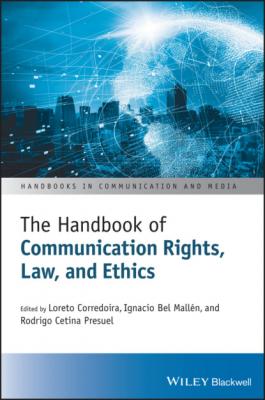The Handbook of Communication Rights, Law, and Ethics. Группа авторов
Чтение книги онлайн.
Читать онлайн книгу The Handbook of Communication Rights, Law, and Ethics - Группа авторов страница 28
 (accessed July 24, 2020).
(accessed July 24, 2020).26 Lecaros, M.A.J. (2003). Una mirada ética en torno al pluralismo, la objetividad y la información. In: Veracidad y objetividad: desafíos éticos en la sociedad de la información. (ed. Congreso International de Ética y Derecho de la Informatión), 57–80. Valencia: Fundación Coso Para El Desarrollo De La Comunicación Y La Sociedad.
27 Malcolm, J. (2017). Digital rights groups demand deletion of unlawful filtering mandate from proposed EU copyright law. Electronic Frontier Foundation, EFF. https://www.eff.org/deeplinks/2017/10/digital-rights-groups-demand-deletion-unlawful-filtering-mandate-proposed-eu (accessed September 16, 2020).
28 MediaLab Press (2017). Digital News Report España 2017. https://medialab.press/los-medios-tradicionales-siguen-siendo-los-mas-confiables-la-audiencia-digital-espanola (accessed October 15, 2020).
29 Nieto Tamargo, A. (1973). La empresa periodística en España. Pamplona: Universidad de Navarra, Servicio de Publicaciones.
30 O’Flaherty, M. (2012). Freedom of expression: Article 19 of the International Covenant on Civil and Political Rights and the Human Rights Committee’s General Comment No 34. Human Rights Law Review 12 (4): 627–654.
31 Padovani, C. and Pavan, E. (2006). The emerging global movement on communication rights: a new stakeholder in global communication governance? Converging at WSIS but looking beyond. In: Making Our Media: Mapping Global Initiatives Toward a Democratic Public Sphere (ed. C. Rodriguez, D. Kidd, and L. Stein), 345–359. Creskill, NJ: Hampton Press.
32 Price, M. (2014). Free Expression, Globalism and the New Strategic Communication. Cambridge: Cambridge University Press.
33 Raboy, M. (2004). The WSIS as a political space in global media governance. Continuum. Journal of Media and Society 18 (3): 345–359.
34 Sánchez Ferriz, R. (1975). El Derecho a la Información. Valencia: Cosmos, Colección Cátedra Fadrique Furió Ceriol.
35 Sheffield, C. (2015). S&P settlement sets chilling precedent against free speech. Forbes (28 January). https://www.forbes.com/sites/carriesheffield/2015/01/28/je-suis-sp-governments-chilling-effect-on-credit-rating-agencies/#712ebf7b1a7d (accessed July 24, 2020).
36 Stephens, M. (2005). Freedom of Expression: The Global Challenge. Conferencia Dictada En Oxford. Disponible En El Programme in Comparative Media Law & Policy (PCMLP) En. http://pcmlp.socleg.ox.ac.uk (accessed July 24, 2020).
37 United Nations (1948). The Foundation of International Human Rights Law. https://www.un.org/en/sections/universal-declaration/foundation-international-human-rights-law/index.html (accessed July 24, 2020).
38 United Nations (2011). Human Rights Committee 102nd Session Geneva. http://www2.ohchr.org/english/bodies/hrc/docs/gc34.pdf (accessed July 24, 2020).
39 Wasserman, E. (2017). Safeguarding the news in the era of disruptive sources. Journal of Media Ethics 32 (2): 72–85.
40 Wijnberg, R. (2014). De Correspondent Digital Newspaper Co-founder, Speech and Debate during Google Tent Madrid. https://www.elconfidencial.com/tecnologia/2014-10-30/diez-ideas-que-marcan-como-sera-el-futuro-para-la-prensa-en-internet_427260 (accessed July 24, 2020).
Notes
1 1 This research was started during the Del Amo Scholarship stay at Berkeley, California (Summer 2017). This work was also produced as part of the Ministry of Science Projects DER2015-65810-P as well as the PID2019–105334RB-I00. Loreto Corredoira is Principal Researcher with Rafael Rubio of the last one.
2 2 Press conference by Emmanuel Macron. https://www.pscp.tv/w/1mrGmZQokVdJy. (no longer available)
3 3 Trading of BitCoin on Wall Street since December 2017 can be followed at http://quotes.wsj.com/fx/BTCUSD (accessed January 13, 2021).
4 4 Facebook announced a major change in January 2018. See online press release at https://about.fb.com/news/2018/04/inside-feed-meaningful-interactions/ (accessed January 13, 2021).
5 5 More recently, the Supreme Court ruling of February 28, 2018 (95/2018), exonerated R. Vera, who as user@cassandra mocked the ETA attack against Carrero Blanco in the Franco era as “humiliation of the victims” and “glorification of terrorism.” The family of Carrero Blanco had requested a verdict of not guilty because they considered that a guilty verdict would have been disproportionate to the act. The court ruled that no risk of violent crime existed.
6 6 The legislative proceedings related to the new Directive can be followed at http://eur-lex.europa.eu/legal-content/EN/TXT/?uri=consil:ST_15651_2017_INIT (accessed January 13, 2021). The position of the French, Spanish, and Portuguese delegations can be seen in their Working Paper of October 2, 2017, that was sent to the Council (WK 10644/2017 INIT) Final text Directive (EU) 2018/1808 of the European Parliament and of the Council of November 14, 2018 amending Directive 2010/13/EU on the coordination of certain provisions laid down by law, regulation, or administrative action in Member States concerning the provision of audiovisual media services (Audiovisual Media Services Directive) in view of changing market realities.
7 7 See, for example, the 57 organizations that requested the elimination of a requirement that access and storage providers filter content (Malcolm 2017). See also their open letter to the European Union (Civil Liberties Union for Europe 2017) https://www.eff.org/deeplinks/2018/10/effs-letter-eus-copyright-directive-negotiators (accessed January 13, 2020).
8 8 See the website related to the 2003 Geneva Declaration here: https://www.itu.int/net/wsis/geneva/index.html (accessed January 13, 2020).
9 9 Comment, 45. States should recognize and respect that element of the right of freedom of expression that lies behind the limited journalistic privilege not to disclose information sources.
10 10 See, for example, Spanish legislation (Real Decreto Legislativo 1/1996, Texto Refundido de la Ley de Propiedad Intelectual).
11 11 See Comment no. 34, Human Rights Committee (UN 2011).
12 12 Cfr. Comment “Any restrictions on the